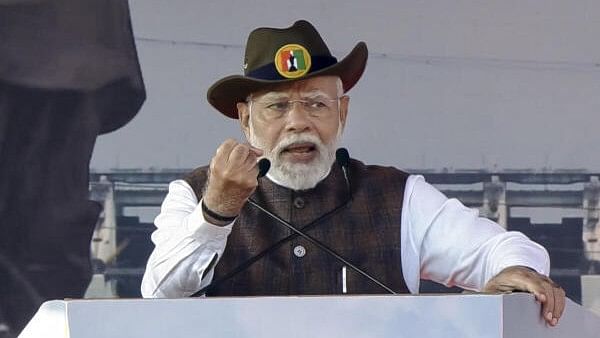
Prime Minister Narendra Modi addresses the Ekta Diwas Parade at the Statue of Unity on the occasion Sardar Vallabhbhai Patel's birth anniversary, in Kevadia.
Credit: PTI Photo
Ekta Nagar: Prime Minister Narendra Modi on Thursday underscored the need to “identify urban Naxals and unmask them” even as Naxalism is ending in jungles. He was addressing a gathering near the iconic Statue of Unity at Ekta Nagar in Gujarat’s Narmada district after paying floral tributes to Sardar Vallabhbhai Patel on the birth anniversary of India’s first home minister.
Since 2014, Sardar Patel’s birth anniversary has been celebrated on October 31 as ‘Rashtriya Ekta Diwas’, or National Unity Day.
Without taking names, Modi said “these people” are also targeting India’s armed forces through a “disinformation campaign” and trying to ignite sentiments of separatism in the Army.
“These people are trying to divide the country on caste lines. Their only goal is to weaken the Indian society as well as people’s unity,” he said.
They don’t want to see India as a developed country because what suits them is the politics of a weaker and poor India, he said, adding that such “dirty politics” went on for nearly five decades.
Modi alleged that though these forces always talk about democracy and the Constitution, they are actually working to divide the country.
The opposition led by the Congress has repeatedly targeted PM Modi claiming that India’s democracy and Constitution are “under attack” by the ruling BJP.
The PM urged the people to identify this nexus of “urban Naxals”, which he said is trying to break the country.
As Naxalism is ending in jungles, a new model of urban Naxals is raising its head, he said.
“We need to identify such people who are dreaming of breaking the country. We have to fight these forces. Today urban Naxals target even those who say that you will remain safe if you remain united. We have to identify urban Naxals and unmask them,” he said.
He said due to the government’s efforts in the past 10 years, Naxalism is counting its last breath in India.
Recalling Sardar Patel’s contribution, Modi said though there were people who were skeptical of India’s unification after the independence, Sardar Patel made it possible. He added that the country will celebrate Patel’s 150th birth anniversary for the next two years.
According to Modi, every scheme floated by his government reflects the “spirit of unity”.
He said benefits were given to every citizen without discrimination, be it Har Ghar Jal, Ayushman Bharat or PM Awas Yojna.
Modi said that after the success of the ‘one nation, one tax’ initiative in the form of GST (Goods and Services Tax), ‘one nation, one ration card’, and ‘one nation, one health insurance’ in the form of Ayushman Bharat scheme, his government is now working on ‘one nation, one election’.
This approach will strengthen democracy and give optimum outcomes on available resources, he said.
“We are also moving towards the implementation of ‘one nation, one secular civil code’. Sardar Patel’s message of unity in society is at the core of this decision. This will eliminate discrimination and strengthen unity among people,” said the PM.
Referring to the abrogation of Article 370, PM Modi said it stood as a barrier in implementing the Constitution in Jammu and Kashmir, where assembly elections were held recently.
“For the first time in 75 years, the chief minister of Jammu and Kashmir has taken oath on the Constitution. I see it as a very important milestone for India's unity. I salute the people of Jammu and Kashmir who gave respect to the Constitution,” he said.
About the ongoing wars in different parts of the world, Modi said India has emerged as ‘Vishwa Bandhu’ (friend of the world).
“India has emerged as Vishwa Bandhu when relations between different countries are getting strained. When differences between nations are growing today, countries are coming closer to India. A new history is being written. The world is watching how India is bringing solutions to its decades-old challenges,” said the PM.